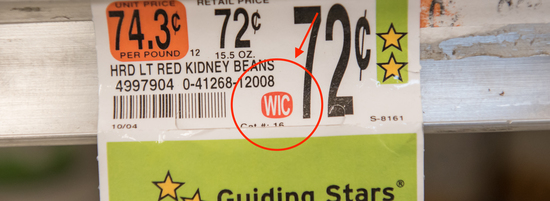With covid I've seen many calls to leave things for others:
- Don't buy WIC-eligible items, leave them for people who can only buy those specific items.
- Don't use grocery delivery services, leave the slots for people who can't go to stores.
- Don't buy masks, leave them for healthcare workers.
- Don't buy groceries at the beginning of the month, leave them for people using EBT, which renews on the first.
Let's set aside for the moment whether these are accurate, [1] does this kind of thing work? These are all cases where at the current price there are many more people who want the thing than people who can supply the thing. In normal times the price would rise until these balanced, but in emergencies our society has chosen not to allow that. Let's say you're considering buying store-brand kidney beans, a WIC-eligible item, the last one on the shelf. If you choose not to buy it, what happens?
One possibility is that it stays on the shelf until someone who can only buy the store brand of kidney beans comes along, and they're able to buy it. Another is that someone who doesn't know to look for the WIC symbol comes along, and they buy it instead.
There are about 7M people covered by WIC in the US, out of a population of 330M, so 1 in 50 shoppers is a decent estimate for what fraction care about the WIC status of items. This means that whether leaving it for someone else is likely to work depends enormously on whether you expect most of society to be going along with it. If it's just you and a few other scrupulous people, probably someone else who isn't on WIC buys the kidney beans, while if nearly everyone is doing this then it probably works.
The thing is, though, getting everyone on board with one of these, distributing the message widely so that everyone hears it, explaining the details of why it matters so people agree and go along with it, is really hard! And pretty much all the time, instead of putting out calls for individuals to leave things for others it makes more sense for sellers to apply restrictions. For example, UK supermarkets have been trying to restrict delivery to vulnerable people and US supermarkets have been designating hours for vulnerable people and essential workers.
Avoiding things in the hope that someone who especially needs them will be able to get them instead usually won't work, and isn't a very good altruistic tradeoff. If you do want to improve distribution in situations like this, encouraging sellers to prioritize is likely much more valuable. Alternatively, look for ways to shift demand to other things and work around the shortage.
[1] For example, in MA distribution of EBT is staggered
throughout the month, but "don't buy on 4/1" was still going around
in local groups here.
Comment via: facebook


Both avoiding delivery and calling stores to encourage prioritization are ways of turning time into a better world. Yes, you can do your own shopping and call your own grocery store, but you have further options. Do you call other stores you go to less frequently and make similar encouragements? Do you call stores in other areas? Do you sign up as an Instacart shopper so there will be more delivery spots available? You write that you can act on both fronts, but if you start thinking of how you might do good with your time you'll quickly have so many potential things you can do that you have to prioritize. I'm arguing that you should prioritize based on how much good the action does relative to how much of a sacrifice it is to yourself.
The link at the end ( https://www.jefftk.com/p/effective-altruism-and-everyday-decisions ) gives more details, but overall I see these as very similar to encouragements to use cold water for showering instead of warm. Yes, there's some benefit to both, but when you compare the benefit to others (the delivery slot has a chance of going to someone else who needs it more than you do, a cold shower means less CO2 emitted) with the cost to yourself (you would prefer grocery delivery and warm showers), most people will have other altruistic options that do more good for less sacrifice.